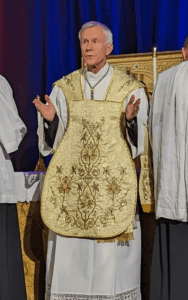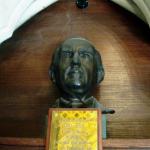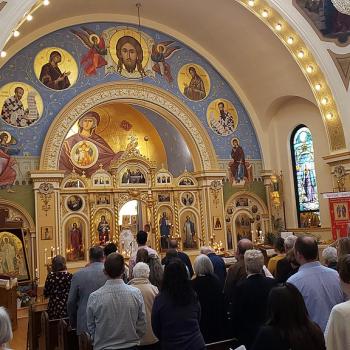
There is something rather twisted coming from so-called traditionalists who claim to represent the traditions of the Catholic Church, and they do so to try to justify themselves when they make it clear they reject the authority of the Pope. If they represent any kind of tradition, it is not Catholic tradition, but rather, the tradition of schismatics and heretics. Like schismatics and heretics in the past, they declare, without authority to do so, that what the Pope has authoritatively determined is in error, justifying, as a result, their disobedience to the Pope.
Novatians, when Pope Cornelius showed mercy to the lapsed, said he did not have the authority to forgive their sins and welcome them back into the fold of the institutional church. Like modern so-called traditionalists, they used earlier decrees and the statement of various bishops to promote their claim. The Novatians, like contemporary so-called traditionalists, acted like discipline could not change, and so denied the authority Christ gave to the institutional church (and especially the Pope) when Christ said: “And I tell you, you are Peter, and on this rock I will build my church, and the powers of death shall not prevail against it. I will give you the keys of the kingdom of heaven, and whatever you bind on earth shall be bound in heaven, and whatever you loose on earth shall be loosed in heaven” (Matt. 16:18-19 RSV).
Similar to discipline, liturgy can be and has been changed much throughout history. While the record of that development is complex, it usually begins on the local level, and eventually, it is accepted by the Pope of Rome, who either allows the change to remain localized, or sometimes, expands upon it, making it more universal. When that happens, every time, there are some who get upset and oppose the changes, saying they go against Scripture and tradition, as for example, when, due to the needs of the time, Rome decided the West would give communion only under one species.
Due to struggles over liturgical changes, over various disciplines, and also various abuses which needed to be reformed but were not being reformed fast enough, many in the West began to question the authority of the Pope. This came to its head when, with the Protestant Reformation, the authority of the Pope to interpret tradition was questioned. Those who rejected that authority, that is, the Protestant Reformers, were honest with themselves, and did not try to portray themselves as being traditional Catholics: they saw themselves as representing a return to a form of Christianity Catholicism had undermined, but they acknowledged the role and authority of the Pope for Catholicism, which is why they did not end up trying to present themselves as being traditional Catholics. Modern so-called traditional Catholics follow the spirit of Protestantism, finding excuses as to why they can ignore the authority of the Pope, but they do so lacking the honesty of the Protestant Reformers because they try to posit themselves as following traditional Catholicism. Some of them try to remain in communion with the Pope of Rome while thinking they have the power and authority to interpret tradition in a way to reject the Pope’s authoritative teaching. Others claim there is no real Pope, making it easy to pretend to be Catholic because they have removed anyone who could have the authority to correct their mistakes when they go astray.
In the end, so-called Catholic traditionalists, like the Novatians, like those before the Reformation like Hus, like Protestants, all hold themselves to be the authoritative interpreters of tradition. They judge everyone and everything based upon their own understanding. They demand everyone follows their ideological perspective to the letter instead of recognizing their own limitations and the need to listen to the Pope and recognize the Pope’s authority is greater when there is debate as to what is permissible or not.
Nicholas of Cusa, one of the brightest, most influential Catholic thinkers before the Reformation, stood by Pope Eugene IV when many in his day were denying Eugene’s authority and declared him to be a heretic. What he said in defense of Eugene shows how the spirit of rebellion in his day mirrors what is found tradition coming from so-called “traditional Catholics.” Against those who said there could be and should be no changes in discipline, or in liturgy, he pointed out that such a position was never held in the past, but rather, the reverse was recognized:
Perhaps you will say: today’s Church does not walk in the rite of communion as in former times, when most holy men affirmed both by word and deed that the sacrament under both species, by which the force of Christ’s precept, was necessary. Could the church have been in error at that time? Certainly not! If not, how is what was then universally affirmed not true today, since the Church is the same as that one? Certainly it should not disturb you that the rite of sacrifices – and even of the sacraments – is found to be different at different times, while the truth stands fast. The Scriptures are both adapted to the times and understood in various ways, so that they are set forth at one time according to the current universal rite, but when that rite changes, opinions about it change again. Christ, to whom the Father handed over the celestial and terrestrial kingdoms, ruling by means of a wondrous order of angels and men, dispenses mysteries according to the changing times; and He supplies what fits particular times by hidden inspiration or evident demonstration. This is the view of the doctors [of the Church]: Ambrose in his twelfth letter to Irenaeus, and Augustine [in his letter] to Deogratias, in the second question on the alteration of sacrifices. [1]
When so-called Catholic traditionalists posit a particular liturgical form, such as the form of the liturgy promoted at Trent, cannot be changed and must remain in place throughout all time as it was at the time of Trent, they not only ignore reality (the liturgy was constantly in flux even after Trent), they deny the authority of the institutional church to meet the people with their needs in the time in which they live. Their understanding of the liturgy is not traditional, but the reverse, and they do this because they confuse Catholicism with the form of the liturgy (which would, of course, mean, Catholicism did not exist since the time of Christ as the form of the liturgy they promote did not come to be until many centuries later).
Nicholas of Cusa, speaking to the “Amedeists,” those who did not recognize Pope Eugene IV’s transfer of the Council of Basel to Florence, and so deposed him as they continued to meet at Basel, putting in his place an anti-Pope, Amadeus VIII, pointed out a problem with their arguments and methodology, a problem which is common with those who contend against Pope Francis today:
It is the custom of the Amedeists to use fictions shamelessly and in every imaginable way in order to give color to their wicked acts. Hence they say: it cannot be denied that one accused as a heretic cuts himself off from the Church, citing [Gratian] C.1q.1 c. [Si quis c. 70]:” If anyone should depart from the Church through heretical presumption, he has condemned himself by the very act.” They also cite [idem] C.4 q.5 c.1, C.24. q.1 cc.1,2 and 3. But [they argue] Eugenius is a heretic. Therefore all that is objected against their trial is profitless. They seek, however, to prove the primary premise from their confected “three truths:” the translation of the council, from the degree which begins Moses, and from the bull they claim was sent to the University of Toulouse.[2]
Today, vocal so-called traditionalists are attacking the Pope, often implying or outright declaring him to be a heretic. They might offer different reasons as to why they call him a heretic, but in the end, they agree, he is a heretic and so think he has no authority (whether or not they think he is or remains the Pope). They write all kinds of letters and speeches condemning him and the changes he has brought into the church. When they do so, if people read what they say and compare it with what Pope Francis has proclaimed, it is clear, their arguments are dishonest as they shamelessly misrepresent the Pope to justify themselves and their denial of his authority. They try to claim the Pope is, at best, confusing, creating confusion in the church; in reality, they are the ones creating the confusion by their misrepresentations and lies. Every time they are given explanations, showing they have gone wrong, they ignore what is said, and just continue with their misrepresentations and lies. The words of Nicholas of Cusa, from a different situation, applies just as much to them as it did to the Amedeists:
It is a shame to expend many words on the intrusion of Amadeus, the former Duke of Saxony, which the whole Christian world detests. For those rash men, first, thoughtlessly usurped all papal prerogatives for themselves in the name of the superiority of the council, an act utterly unexampled in written records. And since the Apostolic See, which they could not entirely extinguish, was still in existence along with them, they thought by an extremely high-handed act of suspension to draw to themselves of their own accord all papal authority, although the Church spread throughout the world always vetoed this. [3]
Such lies and misrepresentations can be seen in the open-letter mentioned by Newsweek written by a group of Catholics opposed to Fiducia Supplicans:
A group of 90 Catholic clergymen, scholars and authors have published a joint letter to “all Cardinals and Bishops of the Catholic Church,” urging them to oppose a Vatican document approved by Pope Francis that allows priests to bless same-sex unions for the first time.
Those who have signed the open letter include Gil Bailie, a member of the Fellowship of Catholic Scholars; Dr. Regis Martin, a professor of theology at Franciscan University Steubenville; and Rev. Robert Sirico, president of the Catholic St. John Henry Newman Institute in Michigan.[4]
These Catholic have no authority in and of themselves, but they are trying to have Catholics follow their teachings and claims about Catholicism over and above the Pope, that is, they are trying to act as if they are the Pope instead of Pope Francis. And to do so, they misrepresent Fiducia Supplicans; they claim it does something which it does not (which is bless gay wedding celebrations).[5] Fiducia Supplicans makes it clear, people can be blessed, and they can come together to be blessed, but such blessing must not be confused as representing sacramental marriage:
Within the horizon outlined here appears the possibility of blessings for couples in irregular situations and for couples of the same sex, the form of which should not be fixed ritually by ecclesial authorities to avoid producing confusion with the blessing proper to the Sacrament of Marriage. In such cases, a blessing may be imparted that not only has an ascending value but also involves the invocation of a blessing that descends from God upon those who—recognizing themselves to be destitute and in need of his help—do not claim a legitimation of their own status, but who beg that all that is true, good, and humanly valid in their lives and their relationships be enriched, healed, and elevated by the presence of the Holy Spirit. These forms of blessing express a supplication that God may grant those aids that come from the impulses of his Spirit—what classical theology calls “actual grace”—so that human relationships may mature and grow in fidelity to the Gospel, that they may be freed from their imperfections and frailties, and that they may express themselves in the ever-increasing dimension of the divine love.[6]
Blessings are meant to be shared by all, so that God’s love can reach down and help everyone in their own personal needs. Through such blessings, those who ask for them, are given graces which, if they are open to them, should help them become more and more the person God intends them to be. This is why blessings should not be denied to anyone who comes asking for them. We should not circumvent God’s love for humanity and make it reserved to a few people. There is no legitimate argument which can be made that would suggest blessing anyone indicates approval (or disapproval) of who they are and what they are. This is why Pope Francis, responding to critics, said:
In this context of evangelization, I also mention the recent Declaration Fiducia supplicans. The intention of “pastoral and spontaneous blessings” is to tangibly demonstrate the closeness of the Lord and of the Church to all those who, finding themselves in various situations, ask for help to continue – sometimes to begin – a journey of faith. I would like briefly to underline two things: the first is that these blessings, outside of any liturgical context and form, do not demand moral perfection in order to be received; the second, that when a couple approaches spontaneously to ask for them, one does not bless the union, but simply the people who have required it together. Not the union, but the people, naturally taking into account the context, the sensibilities, and the places where one lives and the most appropriate ways to do it.[7]
Sadly, many who call themselves traditionalists are doing all they can not only to ignore the authority of the Pope, not only to act as the judge to the Pope (contrary to tradition), but to deny the traditional understanding of blessings. They are very rigid and legalistic in their ideology, and it is this legalism which makes it difficult for them to accept the church when the church tries to show mercy to others. Those who are like this can be said to be heirs to the Novatians instead of traditional Catholicism. Many of them, likewise, oppose liturgical changes, and expect the liturgy to reflect their own desires, making it clear, they confuse the liturgy and a specific form of the liturgy for Catholicism. As there are historically a variety of liturgical forms used by the church, even in the Western rite, Catholicism is not defined by a particular form of the liturgy. Catholicism is a faith tradition which creates liturgies to meet the needs of the people where they are at in a particular time and place. In this way, so-called traditionalists end up being similar to Protestants, though instead of using Scripture as the basis for their criticism of Catholicism, they use a particular form of their liturgy, and their understanding of it, as the basis to judge what is happening in contemporary Catholicism. They ignore the authority Christ gave to the church to promote and engage people where they are at instead of demanding some legalistic, inflexible form of worship.
Traditional Catholicism is a living, changing Catholicism. It seeks to bring God’s love to the world, sharing God’s grace to those in need. It does not see itself as being represented in one, inflexible form of liturgy, nor by a legalistic spirit which tries to find all kinds of ways to deny God’s graces to others. It has its dogmas, which is constantly explores, and in doing so, comes to new, and greater understanding of them, and because, sometimes, this can be a difficult process, with people contending against each other, it also has an authoritative arbiter, the Pope. Those who reject that arbitration and try to put themselves into the position of the Pope have abandoned the traditional faith, no matter how much of the relics of the past they might try to pick up and use.
[1] Nicholas of Cusa, “To the Bohemians: On The Use of Communion” in Nicholas of Cusa: Writing on Church and Reform. Trans. Thomas M. Izbicki (Cambridge: Harvard University Press, 2008), 21-3
[2] Nicholas of Cusa, “To the Diet of Frankfurt” in Nicholas of Cusa: Writing on Church and Reform. Trans. Thomas M. Izbicki (Cambridge: Harvard University Press, 2008), 241.
[3] Nicholas of Cusa, “To the Diet of Frankfurt” 251.
[4] James Bickerton, “Pope Francis Rebellion Grows as 90 Catholic Figures Sign Scathing Letter” in Newsweek (2-3-2024).
[5] Whether or not the thing they contend about should be allowed is a different question one which is beyond the scope of the discussion here. What is important is what is actually in place, showing how those who are attacking the Pope are misrepresenting it. In doing so, it is clear, they represent what Nicholas of Cusa said was wrong with the Amedeists – they are willfully lying to confuse the people and gain power for themselves and their own ideology.
[6] Dicastery for the Doctrine of Faith, Fiducia Supplicans. Vatican translation. ¶31.
[7] Pope Francis, “Address To The Participants In The Plenary Session Of The Dicastery For The Doctrine of Faith” (1-26-2024). Vatican translation.
Stay in touch! Like A Little Bit of Nothing on Facebook.
If you liked what you read, please consider sharing it with your friends and family!
N.B.: While I read comments to moderate them, I rarely respond to them. If I don’t respond to your comment directly, don’t assume I am unthankful for it. I appreciate it. But I want readers to feel free to ask questions, and hopefully, dialogue with each other. I have shared what I wanted to say, though some responses will get a brief reply by me, or, if I find it interesting and something I can engage fully, as the foundation for another post. I have had many posts inspired or improved upon thanks to my readers.












